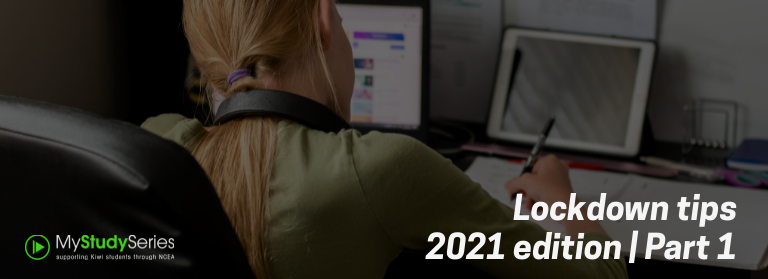Lockdown 2021 Tips | Part One!

New Zealand is a week into our first lockdown in almost a year. Schools have pivoted to an online delivery of learning, and as students you’re expected to take the adjustments in stride and carry on. While most of us do this well (we’re Kiwis aren’t we?!), some of us will be looking for some support to help us get through this period.
Here are five (of ten) tips to support you as you learn from home, away from the support of your teachers and peers
1. Keep a routine
One of the easiest things to do when you are operating outside of what is normal, is to lose your routines. Routines are vital in being able to maintain some sense of normality. The habits you’re accustomed to, help guide you throughout the day, so it is important to maintain these as much as possible. Do you normally get up at 6:30am? Try to maintain this as a routine (even though you don’t have to commute to school throughout this period). Do you normally go to the gym straight after school? Find some opportunity to participate in physical activity during that same time frame. When it becomes time to return to school, this transition will be much easier for you if you have maintained some of these habits and routines.
2. Set yourself some goals
With uncertainty, comes frustration. Much like the power of routines, goal setting can be grounding. When it is hard to see the light at the end of the tunnel, goals allow you create smaller targets to work towards, keeping you focused on the task and hand, and motivated to continue achieving. While many people talk about SMART goals, there is a lot to be said for simplifying this approach. A common strategy I like to use is to set one major achievement you want to chase down today. It could be complete all of your work for Mathematics. Take this top level goal, then set 5 sub goals to sit under it. These could be 1) Identify all of the tasks that need to be completed 2) read over an exemplar 3) compile a list of resources that could support me in the task, then engage with that list 4) Check in with one of my peers to talk about the required tasks 5) Set a target time for completion.
These five smaller steps help break down the larger task. By completing these sub goals, you generate a number of small wins, keeping you motivated to push ahead.
3. Identify your strengths and weaknesses
It’s easy in a time like this to play to our strengths and focus on what we’re good at. However, the longer lockdown goes on for (and currently we know that Auckland is looking like they could be in an extended lockdown), the less this approach serves us. If we’re to sustain our efforts over an extended period of time, it’s important to recognise what our weaknesses might be, and focus on bringing those up. Do you struggle to do the required readings and lesson prep each day? Lets look at how we can prioritise the things we’re not good at, embrace some of the challenging tasks and these weaknesses into strengths. Do hard things. This simple yet straight forward approach will ensure you continue to move the waka forward regardless of your identified weaknesses. And if you’re struggling, reach out to your teachers or support network.
4. Physical activity
During the lockdown off 2020, Otago University identified that 38.5 percent of surveyed Kiwis did more physical activity than prior to lockdown. This is a great start, but the flip side to that is, they also identified that 36% of Kiwis did less physical activity than prior to lockdown. This is a worrying statistic. We know how important physical activity is from a Hauora perspective, so we really need to be prioritising this every day.
Almost Almost half (45 percent) of those people identified by Otago University as being less active during lockdown said they were unable to do their preferred form of exercise, such as going to the gym or surfing due to lockdown restrictions. This is a key barrier we need to overcome. Here are some simple approaches that will help you get closer to the recommended daily physical activity requirements:
Take short active breaks during the day. Short bouts of physical activity will help get the heart rate up and contribute to your weekly activity levels. Examples could be dancing, playing with siblings, and helping whānau out with domestic chores like cleaning and gardening.
Follow an online exercise class. Take advantage of the wealth of knowledge online. Many of these are free and can be found on YouTube or other mediums. Be wary of your capability and don’t over exert yourself through classes that might be beyond your skill set.

Walk. Get outside and walk (or run!). Outdoor activities are limited under level 4. You must stay in your bubble, maintain physical distancing, and keep walks short, local, and for essential exercise only. Stick to simple outdoor exercise, and avoid activities where you can get injured or lost. For example, do not go swimming, surfing, boating, hunting or tramping. It is important emergency services remain available to support the response to Covid-19.
Relax. Meditation and deep breathing can help you remain calm. Good options to consider are app based approaches such as Calm and Headspace.
5. Physical environment
A big difference between working from home and working from a school, is that one of those environments are designed to maximise your ability to learn effectively, the other is generally designed for comfort. Trying to learn in an environment designed for comfort is not particularly conducive to high quality work! There are some things we can do though.
If your kitchen table is available, try doing most of your work here. The stable table will support whatever device you’re using, and a kitchen chair is going to be the closest thing to a school chair which is designed with good posture in mind. When sitting at your workspace, try to maintain a straight back and have your device placed as close to eye level as possible. The easiest way to achieve this is stack some books to get your device as high as possible. If you need to type in this position, try to gain access to a separate keyboard and mouse. Try to take as many breaks as possible, and avoid working from your bed at all costs!
These are five easy tips to support you in lockdown. Have a go at implementing them, and keep an eye out for part 2 next week!







Responses